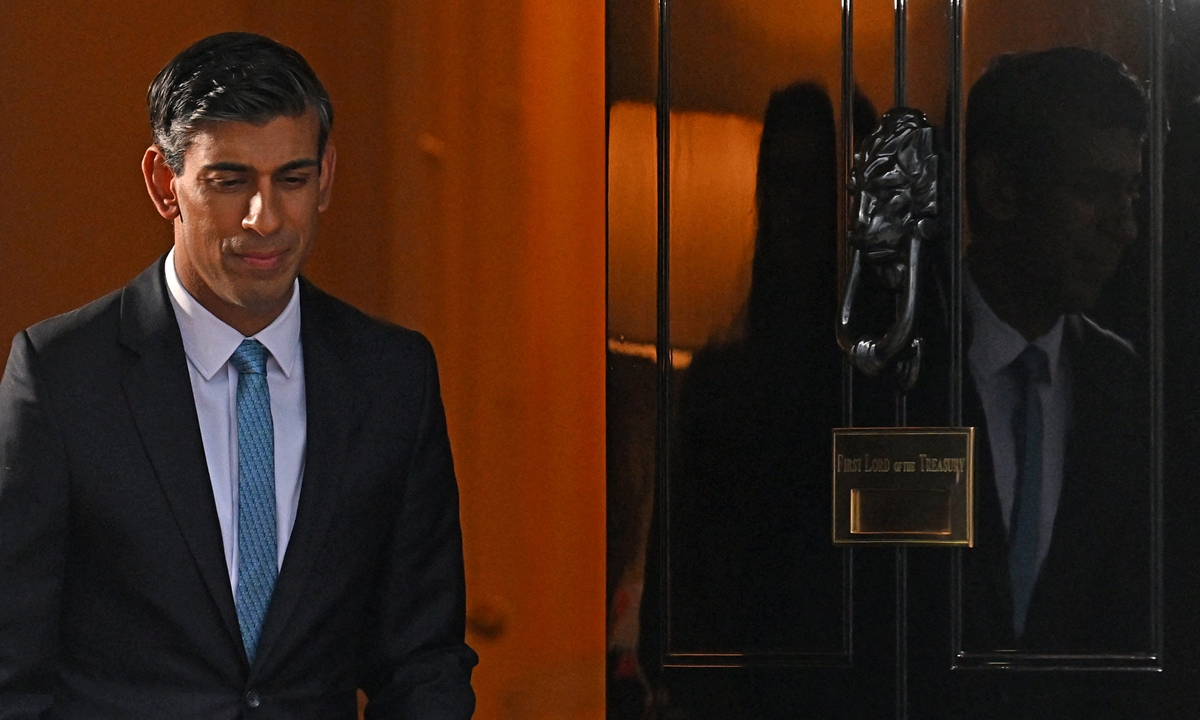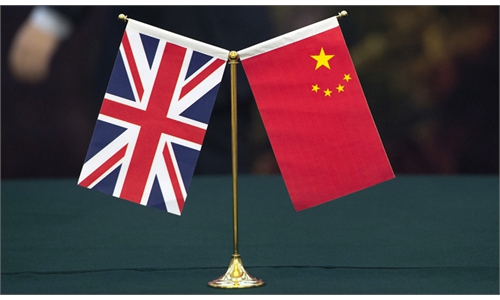
UK Prime Minister Rishi Sunak Photo:AFP
The UK government has announced it will "ramp up investment in defense" in its 2023 Integrated Review, which pledges to "respond to emerging geopolitical threats" including "China's economic coercion", by significantly raising UK's military spending in the coming two years, which experts said to be mainly catering to US' strategic goals.
The UK's repeated provocations and the continuous hype of the so-called "China threat theory" will negatively impact China-UK relations and disturb their cooperation, the experts warned.
The updated Government's Integrated Review of Security, Defense, Development and Foreign Policy (IR23) is an attempt to "find a balance between taking a tougher approach to China" while maintaining cooperation with China in certain areas, The Telegraph reported.
When the Integrated Review was published in 2021, it described China as a "systemic competitor."
However, UK Prime Minister Rishi Sunak said on Sunday that China presented an "epoch defining challenge" to the global order but it would not be a "smart or sophisticated foreign policy to reduce" the relationship with Beijing to just two words, such as labeling it "a threat," Reuters reported.
Sunak has also confirmed a 5 billion pound ($6 billion) additional investment in defense in the coming two years and a new long-term military spending ambition as he arrives in the US for a trilateral meeting on the next phase of the AUKUS program, according to the UK government's official site.
He will also set out an ambition to increase defense spending to 2.5 percent of GDP in the longer term.
"The UK's tougher stand on China is to cater to the strategic goals of the US, and to enhance the so-called UK-US special relationship," Liu Zuokui, a research fellow on European studies at the Chinese Academy of Social Sciences, told the Global Times on Monday.
Liu noted that in recent times, the UK's foreign policy has followed that of the US closely, which caused the inevitable decline of the country's global influence after Brexit.
"In addition, with the downward spiral in China-UK relations, it has become a routine for the UK to make some provocative remarks against China from time to time," Liu said. "As the UK's overseas influence has dropped, it wants to maintain its overseas influence. A very important way to do that is to display a tough attitude toward China."
Observers point out that the UK's future China policy is expected to largely follow the heels of Washington, but it is unlikely to be exactly the same.
Within the UK, some advocate for a complete bundling of interests with the US, while others want the UK to remain cooperative with China, both of which Sunak needs to accommodate, experts said.
Liu warned that the UK government's repeated provocations and hype on the "China threat theory" are having a negative impact on China-UK relations.
"In fact, the scale of both existing and potential cooperation between China and the UK is very large. If the UK government continues to be provocative toward China, the areas of cooperation are likely to be affected, which Sunak needs to consider," he said.
On February 20, during a phone call with UK Secretary of State for Foreign, Commonwealth and Development Affairs James Cleverly, Chinese Foreign Minister Qin Gang said that a sound China-UK relationship serves the interests of both countries and also contributes to world peace and development.
China is not a challenge or threat to the UK, Qin said, adding that he hopes the UK side takes an objective and rational view of China's development and works with China to meet each other half way, enhance mutual trust, properly handle differences and disputes, set up a correct recognition of each other, strengthen cooperation, and promote the sound and steady development of bilateral relations.


